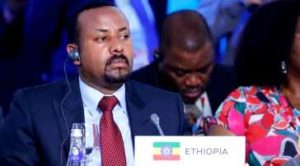By AREGU B. WONDIMUNEH – Change has been a buzzword that reverberated in the ears of most citizens following Ethiopia’s Abiy Ahmed coming to power.
However, Abiy’s promises of sweeping changes to Ethiopia’s political system which otherwise was designed to serve dictators and dictatorship, were soon held back thanks to the ceaseless and all-out distraction from his opponents.
“The world as we have created it is a process of our thinking. It cannot be changed without changing our thinking,” said Albert Einstein at one time.
It was evident from early on that opposition to Abiy’s administration would come mainly from two groups: ethnic nationalists who feel that their ethnic-based politics will lose its social base as a result of Abiy’s increasingly popular agenda of Medemer (synergy through national unity), and those who suddenly lost grip on power.
The former believe that their existence as a political entity is dependent on the existence of acrimonious relationship among the different ethnic groups which they nurture through hate speech, made up history, and playing a ‘victim’ card.
The latter are remnants of the TPLF-led government who unexpectedly lost the political power they monopolized for 27 years. This group are ready to make a pact with the devil and hell-bent on creating chaos and instability in the country as part of their desperate attempt to come back to power.
Oromo ethnic nationalists and former TPLF officials which rather had antagonistic past formed unholy alliance only to attack the 2019 Nobel Peace Prize Winner, Abiy Ahmed and his administration from every direction.
From indiscriminately criticizing the government’s agenda to assassination attempts, and from inciting violence to orchestrating ethnic-based attacks, all were planned and executed to derail the change from its course. As a result, the much-touted change Abiy’s leadership promised seems to be a high-hanging fruit.
When the Prime Minister and his team move one step forward, ethnic-hardliners and their tactical allies drag the entire process two steps backward. These are the same group of people who call themselves activists and political opponents but whose main mission is to see a weakened or disintegrated Ethiopia.
The killings and displacements of innocent civilians have been day today occurrences of the past one year. Absence of decisive measures from the government to root out the sources of problems that lead to conflicts and displacements, has made many of Abiy’s supporters feel less protected and less confident in his leadership.
The recent massacre of innocent civilians in Oromia region was a clear evidence of how far ethnic nationalists can go if left unchecked, and how the government’s weak position let that to happen.
Following the call of Jawar Mohammed, an individual who calls himself activist, more than 85 innocent civilians were brutally murdered in an attack that targeted ethnic origins and religions.
Once again, the situation tested the prime Minister’s ability of dealing with change saboteurs. In a public address he gave following the tragic incident the prime Minister was far from reassuring.
He was rather seen mincing his words, failing to send clear and strong message to those involved in the terrorist act and its architect. And that has frustrated the Prime Minister’s support base.
While wary of his handling of the situation so far, Prime Minister Abiy’s supporters would want to believe that his administration has all it takes to ensure peace and stability in the country.
They also have their own theories of why the Administration was unable to stop the killings and displacements so far: One theory is that Abiy was being extra cautious of not aggravating ethnic tensions in response measures and at the same time buying time until when it is right to toughen protective and response measures.
The other theory is that the current problem in the country is rooted in Abiy’s own ruling party. Ethnic nationalists have infiltrated his ruling party and are conspiring against his administration to make it look weak and inefficient.
The ongoing unrest and killings are taking a toll on Prime Minister’s popularity. It is high time that his administration stepped up efforts to ensure peace and stability across the nation. Ethnic hardliners and irresponsible activists have already caused so much damage to the people and the country.
Now the people are saying, “enough is enough!”. Whoever is causing any harm to the people and the country should be made accountable to their actions.
Those who are working to sabotage the government’s change agenda may not represent the majority, but their irresponsible actions can cost the country dearly. As the popular saying goes: few bad apples can spoil the barrel.

